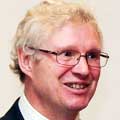FT Sightsavers MBA Challenge - Judging panel
Roula Khalaf, Editor of the FT, selects her favourite stories in this weekly newsletter.
Benjamin Kohler, worldwide general manager of Polaroid Eyewear

Benjamin Kohler has been the worldwide general manager of Polaroid Eyewear since December 2001, having previously held the positions of European general manager, European marketing and sales director and country manager for Switzerland within Polaroid Eyewear, where he started working in 1990.
Mr Kohler is currently based in the US where he moved to from Zurich, Switzerland August 2010 to spearhead the re-launch of the Polaroid Eyewear brand in the US market.
Guy Pfeffermann, founder of the Global Business School Network

Guy Pfeffermann founded of the Global Business School Network in 2003 on the principle that skilled management is critical to successful international development. After 40 years as an economist at the World Bank, including 15 years as chief economist at the International Finance Corporation, he saw too often how lack of management talent was impeding economic and social development in communities throughout the developing world. Now as chief executive of GBSN, Mr Pfeffermann oversees programmes and events that bring together 50 leading business schools to strengthen the institutions and educators who teach management in the developing world.
Pfeffermann is currently on the Advisory Board of the Association of African Business Schools. His most recent publication is Empowering tomorrow’s African entrepreneurs and managers: the Global Business School Network, Journal of International Relations and Development (2011).
Prior to founding GBSN, Pfeffermann was an adjunct professor at John Hopkins University, School of Advanced International Studies and served as a member of the board of directors of the Global Giving Foundation.
Sir Michael Barber, chief education advisor to Pearson

Sir Michael Barber, a leading authority on education systems and education reform, is Pearson’s chief education advisor, leading Pearson’s worldwide programme of research into education policy and efficacy and, in particular, leading Pearson’s strategy for education in the poorest sectors of the world.
Prior to joining Pearson, Sir Barber was head of McKinsey’s global education practice. He co-authored two major McKinsey education reports: How the world’s most improved school systems keep getting better (2010) and How the world’s best-performing schools come out on top (2007). He is also Distinguished Visiting Fellow at the Harvard Graduate School of Education and holds an honorary doctorate from the University of Exeter.
Barber previously served the UK government as head of the prime minister’s delivery unit and as chief adviser to the Secretary of State for Education on school standards. Before joining government, he was a professor at the Institute of Education at the University of London.
Lord Nigel Crisp was appointed chairman of Sightsavers in November 2007. His main role is co-chairing an international task force on scaling up the training and education of health workers in developing countries as part of the Global Health Workforce Alliance.
Previously, Lord Crisp was chief executive of the NHS and permanent secretary of the department of health from 2000 to 2006. He joined the NHS in 1986 and has managed mental health and acute services. He was also chief executive of the Oxford Radcliffe Hospital NHS Trust, one of the country’s leading academic centres.
Crisp is a Cambridge philosophy graduate, an honorary professor at the London School of Hygiene and Tropical Medicine and a senior fellow at the Institute for Healthcare Improvement. He became a member of the House of Lords in 2006.
Paul Polman, chief executive of Unilever

Paul Polman became an executive director of Unilever in October 2008 and assumed the role of chief executive officer in January 2009. Prior to this he held senior positions at both Procter & Gamble and Nestlé.
In February 2010, Mr Polman was appointed a non-executive director of The Dow Chemical Company. He is vice chairman of the World Business Council for Sustainable Development and a member of the international business council of the World Economic Forum and the Swiss American Chamber of Commerce. He is also on the board of the Consumer Goods Forum, where he co-chairs both the board strategy and the sustainability committees.
Polman serves as president of the Kilimanjaro Blind Trust and chairman of Perkins International Advisory Board.
Peter Tufano, dean of University of Oxford’s Saïd Business School

Peter Tufano is the Peter Moores dean and professor of finance at Oxford University’s Saïd Business School. Since joining Oxford in July 2011, Professor Tufano has led the development of the new Oxford 1+1 MBA Programme, a two year customised management education that combines an MBA with one of Oxford’s many specialised masters programmes.
Prof Tufano’s research has focused on innovation, most recently how innovations in consumer finance can improve the delivery of services to low income families. He has developed courses on consumer finance, founded a non-profit R&D lab for new financial product development and served on advisory groups in the US (and now the UK), addressing the issue of financial inclusion. The Saïd school is also the home of the Skoll Centre for Social Entrepreneurship.
Before joining Oxford, Tufano spent 33 years at Harvard, most recently serving as professor and senior associate dean at Harvard Business School, as well as the co-founder of the Harvard University Innovation Lab (i-Lab).
Richard Meddings, group finance director of Standard Chartered PLC

Richard Meddings was appointed group finance director of Standard Chartered PLC in November 2006, having joined the board as a group executive director in November 2002. Based in London, he is responsible for finance, group corporate treasury, risk and group corporate development. He became a non-executive director of 3i Group plc in September 2008 and is a member of the governing council of the International Chamber of Commerce, in the UK.
Mr Meddings is also the chairman of ‘Seeing is Believing’, Standard Chartered’s global initiative to tackle avoidable blindness. Since 2003, Seeing is Believing has raised more than $40m, which has been invested in projects in more than 20 countries. Standard Chartered has pledged to raise a total of $100m by 2020, helping to bring eye care to the most disadvantaged communities around the world.

Comments